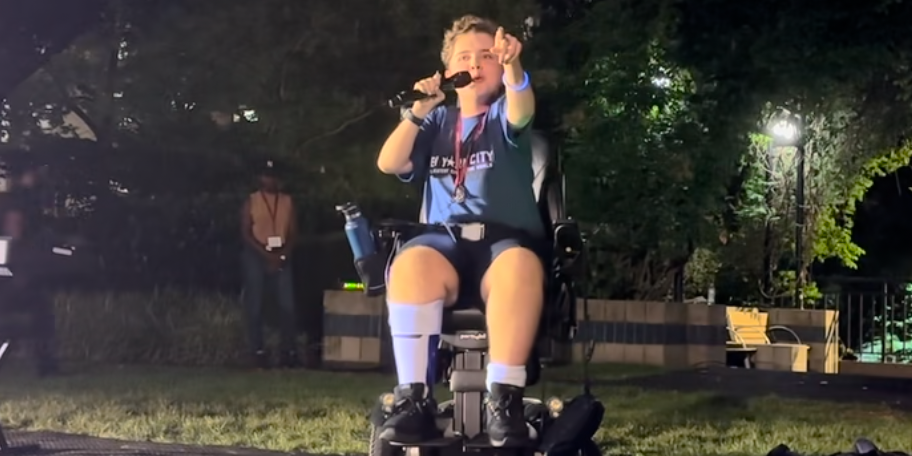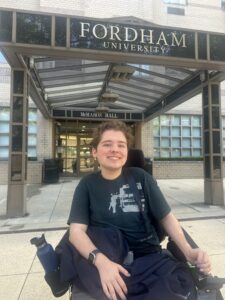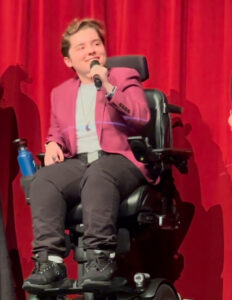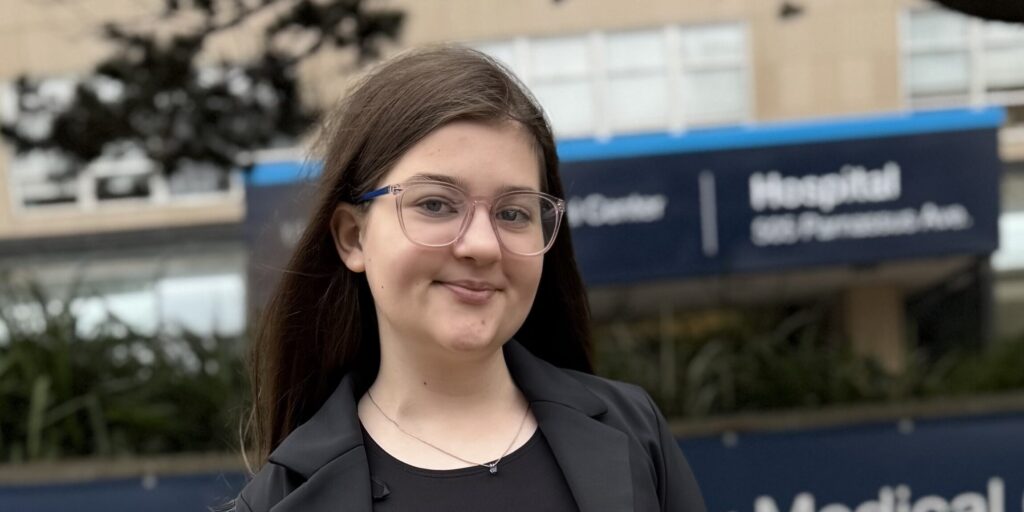
First Semester in a New York Minute
By Jonathan Lengel | Thursday, February 20, 2025
5 Second Summary
MDA’s College Scholarship Program provides support to students living with neuromuscular disease as they pursue their academic dreams. Merit-based scholarships are awarded to students who demonstrate leadership qualities and are making an impact in the neuromuscular community. More information and application criteria can be found at mda.org/scholarship.
Jonathan Lengel is a 2024 MDA College Scholarship recipient.
Read more personal stories from members of the neuromuscular community about their College Experience as they share their journey, accomplishments, advice for accommodations and overcoming barriers, and insights into navigating college life with a disability.
Jonathan Lengel is an actor, singer, and performer best known for his role as Archie in Netflix’s Broadway Adaptation of 13: the Musical. Jonathan lives with a rare form of congenital muscular dystrophy. An MDA Ambassador since 2019, Jonathan received an inaugural MDA Scholarship in 2024. He is currently pursuing a double major in Digital Technologies and Emerging Media and Music at Fordham University. Follow Jonathan Lengel on Instagram @jlengeloffical.

Freshman move-in day at Fordham
Nobody would ever accuse me of being inconspicuous. Aside from the fact that I wheel into a room in a power wheelchair, I’m known for having a big personality. The first night of freshman orientation at Fordham University: Lincoln Center, I decided to make an entrance. At the open mic night, I belted out “New York, New York” on the campus Plaza in front of the entire freshman class. After that, my whirlwind of a semester began. From that point on, I was never able to blend into the crowd or remain anonymous. The funny thing is, I like it that way because it serves a purpose. If I’m being honest, it’s a personal icebreaker. That performance ensured that my classmates will forever see me as the guy who can sing and put on a good show, rather than just the kid in the wheelchair. Performing has always given me a certain level of confidence. Let’s face it: navigating and living on a college campus for the first time is a huge transition and most definitely requires confidence. College as a power wheelchair user comes with a myriad of challenges other students can’t even begin to imagine. Confidence, as it turns out, wasn’t the only thing I needed.
College was the first time that I would live on my own and manage a personal care attendant to help me each morning. I also had to make sure I was getting enough rest when needed and keeping up with my weekly visits to my physical therapist. In addition, finding your way around campus is something all freshmen worry about but comes with added layers of concern for me. Which buildings have or don’t have automatic door openers? Where are the accessible entrances located? Should I just knock to cue someone to open the classroom door for me? Should I ask the person next to me to help get my backpack off my chair? How do I adjust the accessible desk in the classroom? Where do I go when the fire alarm goes off in the middle of the night? And, because it’s New York City, how do I push my way into a crowded elevator during the morning rush to class? On and on, a slew of questions went through my mind day in and day out. Initially I felt pressure having to think logistically about everything just to get through the day. However, I learned by doing until it became part of my daily routine. I attribute my ability to adapt in the face of adversity to my circumstance as a person born with a physical disability.

On stage with the Fordham F-Sharps A cappella Team at the 2024 Winter Concert
While I adjusted, wonderful things started to happen. It became second nature for the other students to prop open the doors for me and help out when I needed it. I made so many friends as I auditioned for and made it onto the F-Sharps, the college’s a cappella team. I also participated in musical theater cabarets, songwriting club, and open mic nights. I fell into a groove with my academic workload and thrived in the small environment at Fordham LC, getting to know each of my professors personally. The sheer fact that I was living in the heart of New York City was also a dream come true for me.
“New York is my campus. Fordham is my school,” is our school motto and it’s very true. My wheelchair logged hundreds of miles exploring Central Park, the Shops at Columbus Circle, Broadway, Times Square, Hell’s Kitchen, and my Upper West Side neighborhood. I saw Cyndi Lauper at Madison Square Garden, Jason Robert Brown at Carnegie Hall, and a variety of shows at Dizzy’s Jazz Club. Outside my two-block campus, I reveled in the sights, sounds, and culture of the city. I’ve met people from around the world as far away as Indonesia and China. I frequently visit the Fordham Rose Hill Campus in the Bronx, volunteering in University Heights and taking in the diverse neighborhood along Arthur Avenue.
Choosing a college and accessing higher education certainly comes with an array of challenges and barriers for students with disabilities. It’s not always easy or smooth and my journey to finding and choosing Fordham was no easy feat but that’s for another blog. I’ve been fortunate to have found my place at Fordham and have been very supported by the University, including the offices of Disability Services and Residential Life. I started out my college journey with a big entrance and it personally helped me to successfully transition. At the end of the day, while my disability definitely presents its daily dose of challenges, I choose to focus on things that are in my control. I am seeking the same meaningful college experience that all students who choose to live away from home want for themselves.
And with the risks have come the rewards. One night, early in my first semester, as I waited outside for my Uber Eats driver next to the fountain at Lincoln Center, I could hear the opera over the loudspeakers. I thought to myself, “it doesn’t get any better than this.” I was home.
Next Steps and Useful Resources
- More information and application criteria for the MDA’s College Scholarship Program can be found at mda.org/scholarship.
- For more information about the signs and symptoms of Congenital muscular dystrophy (CMD) , as well an overview of diagnosis and treatment concerns, an in-depth review can be found here.
- MDA Community Education empowers the neuromuscular disease (NMD) community through high-quality educational programs and materials. Learn valuable skills for overcoming common barriers in Access Workshops, get up-to-date information from experts in the field and connect with other families at Engage Symposiums, print out educational materials, and more.
- MDA’s Resource Center provides support, guidance, and resources for patients and families. Contact the MDA Resource Center at 1-833-ASK-MDA1 or ResourceCenter@mdausa.org
- Stay up-to-date on Quest content! Subscribe to Quest Magazine and Newsletter.
Disclaimer: No content on this site should ever be used as a substitute for direct medical advice from your doctor or other qualified clinician.




